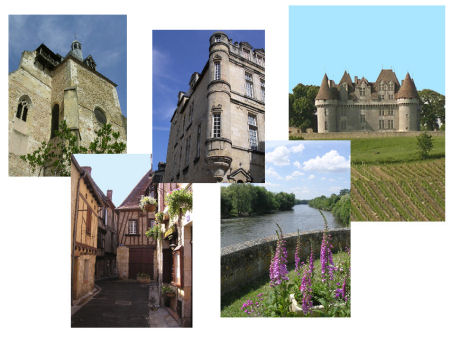| |
 |
The Region |
|
|
 |
Activities |
|
|
|
|
Bergerac region

Looking out over the
Dordogne valley, is the deligntful, fairytale, Chateau de Monbazillac. Here the
tourist can enjoy both : the well preserved example of Renaissance architecture
which has all the medieval military characteristics nevertheless (cannon-ports,
machicolations, moat, etc;) which are from now on simply aesthetic and symbolic;
as well as the food and fine sweet wines of the Monbazillac appellation. The
Chateau de Lanquais is also fascinating. The original fortress was built during
the Hundred Years War to which was added a fine Renaissance palace. The
authenticity of the building and its furnishings plunge the visitors back into
history and the daily lives of past unhabitants.
A little way away, on a bend of the river Couze, is the superb Chateau de
Bannes. standing on a rocky outcrop it provides a beautiful setting for summer
theatre productions.
Many of the traditional craft industries are still practised in the region. One
example can be found at the Moulin de la Rouzique at Couze where paper is still
made from cotton and linen waste.
The south-west corner of the Perigord is also famous for its bastides, a string
of "news" towns created in the 13th century, by both the English and
the French, essentialy to promote commerce. Later,fortified, they became very
important in the Hundred Years War and changed hands many times. Monpazier is
the finest local example but the bastides of Eymet, Lalinde, Beaumont, Molières,
Villeréal and Castillonnès each have a singular charm. The medieval village of
Issigeac offers yet another example of a bygone age and subtly brings the
visitor back to Bergerac and its history.
The area sandwiched between
the rivers Dordogne and Gironde is known as "le Pays de Montaigne" and
offers a variety of scenery and tourist attractions. Good examples are the Tour
de Montaigne, the Jardins de sardy and the Gallo-roman villa at Montcaret.
|
|
 |
Language |
|
|
 |
| . |
 |
|
|